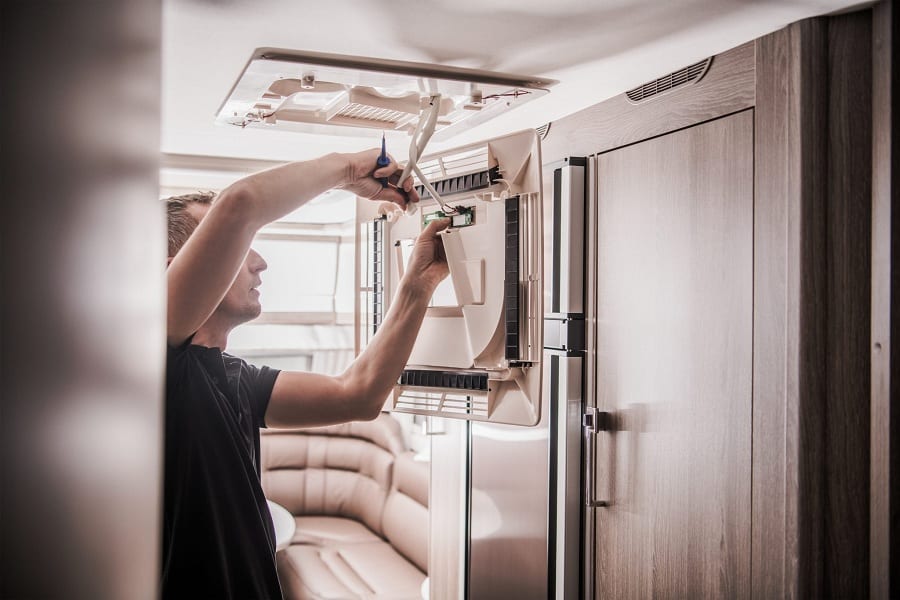When summer rolls around and the evenings heat up, there’s nothing better than having an air conditioner humming along in your RV.
But when it breaks down or starts to fail, there’s nothing worse, and you’ll be scrambling to get it fixed as fast as you can.
So, how do you fix an RV AC?
To fix the air conditioner in your RV requires some basic troubleshooting to determine what the problem is.
The most common issues are lack of power, dirty or broken parts, or a system that’s simply too old to keep up with the demands of your RV.
If this sounds like something you’re facing, the good news is you can usually fix it yourself and get it humming at least until you’re able to call for a professional.
This guide will walk you through the most common RV AC repair steps and how to figure out what’s going on with yours, so read on if you’re having AC woes.
Contents
The Parts of an RV Air Conditioner
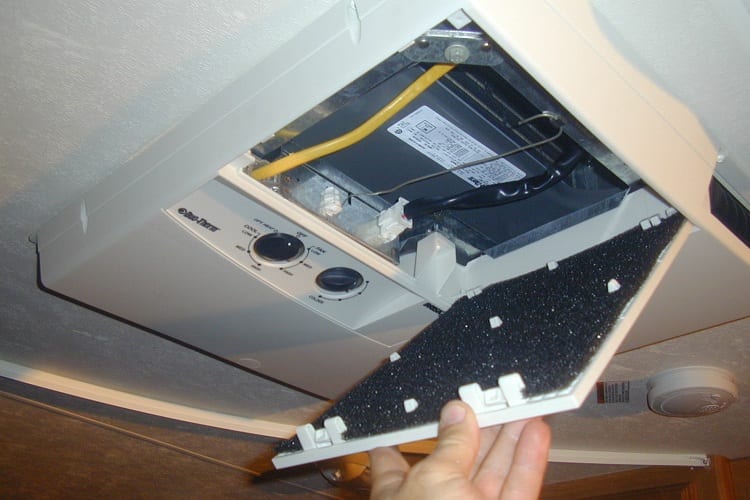
Just like in a regular house, an RV air conditioner can look and operate differently.
The most common type you’ll find in an RV is the roof-mounted variety, and to be able to troubleshoot problems effectively, you need an understanding of the two main parts.
Firstly, the sealed system is where the inside parts of the air conditioner are.
These include a condenser, evaporator, and compressor, all responsible for creating the cool air that’s then blown out to keep you and your RV comfortable.
Secondly, the parts that move the air from the inside of the system to the outside, and interior of your RV. Within here, you’ll find the motor and at least two separate fans.
One fan is for pushing air across the condenser and the other moves it across the evaporator, leaving you with cold, crisp air.
In most cases, you can narrow down an AC problem to one of these areas, but sometimes it could be related to a power supply or other issue.
With a basic understanding of the AC unit, your RV operates though, you’ll be one step closer to finding a fast fix whenever problems do arise.
The Most Common AC Issues and Quick Fixes
Living in an RV means being self-sufficient most of the time, and that includes knowing how to fix things when they break down.
When it comes to your RV’s air conditioner, there are some common issues you’ll come up against, and we’ve got the simple solutions to get it pumping again.
Problem: AC Is Blowing Hot Air
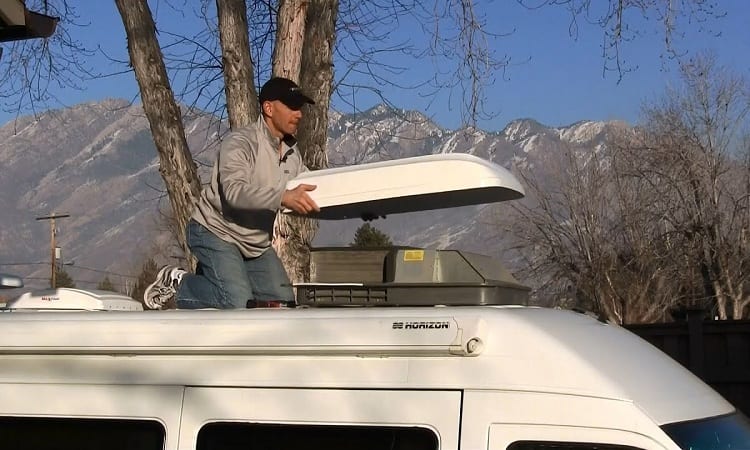
Cause
You turn your AC on only to find that warm air comes out of it instead of cold.
There are a few reasons that this might be happening including a freon leak, poorly maintained and unclean parts, the compressor could be damaged or faulty.
Solution
To determine what’s causing the issue, start with the easiest fix of cleaning the AC, its fans, filters, and other parts. Sometimes, a build-up of dust can prevent it from blowing cold air.
After this, check the freon levels and see if they need to be recharged or if there’s a potential leak somewhere. Finally, the compressor may be faulty which means it has to be repaired or replaced and this should be left to a professional.
Problem: AC Not Cooling the RV
Cause
Even though it’s running, the air inside of the RV doesn’t seem cool enough. This is likely because the AC isn’t powerful enough to cool, it’s become too old, or the weather outside is too hot for it to keep up.
Solution
In this instance, you’ll need to upgrade your RV AC to a new one that’s more capable and energy-efficient. Otherwise, purchasing a backup AC can help with hotter temperatures.
Problem: AC Keeps Turning Off
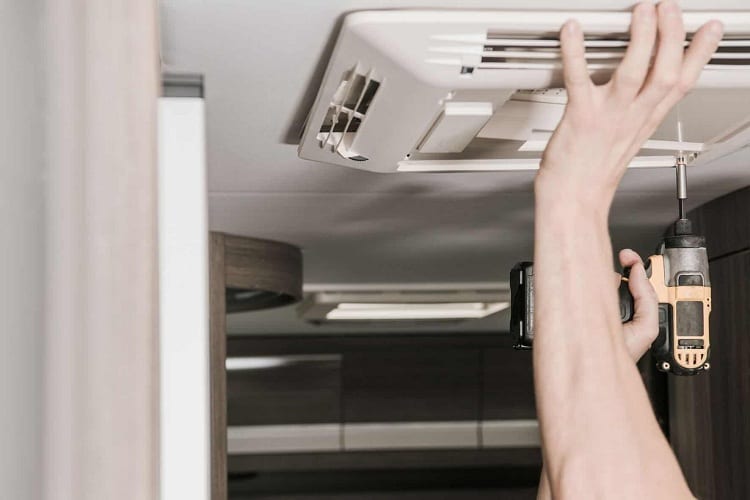
Cause
You’re enjoying your time in the RV and the AC is blowing away without a problem. Suddenly, it turns off altogether and you can’t get it to turn back on.
If there’s no issue with the AC itself that you can see immediately, this is likely a power supply problem that might be affecting the entire RV.
Solution
First, check that you have power running through the rest of the vehicle by plugging something into a 110V outlet. If there is electricity working elsewhere, you might want to check the breaker to see if it’s been tripped.
Once you’ve established there’s no power problem in the RV, you’ll need to take the whole unit in to be diagnosed by a professional as it appears to be an electrical issue.
Problem: AC Is Noisy
Cause
When you first buy your AC it runs quietly and smoothly but after some time, the noise has become loud and unbearable.
A noisy air conditioner could be caused by a few things and it may sound like a chugging, whining, humming, or rattling noise.
The most common cause is that the shock absorbers have moved and are now in contact with the fan or compressor, or another part has come loose and is moving around.
Sometimes, it could be the fan squeaking that is creating the noise.
Solution
Turn off the AC unit and open it up to inspect the parts. Look at the compressor and make sure the shock absorbers haven’t come loose, and if so, put them back in place.
If it seems like the fan, apply some oil to lubricate it and then turn the unit back on to see if that helped.
Problem: There’s Frost Around the AC
Cause
If you notice frost building up around the AC, it’s likely due to a freon problem. Even though there’s frost, the unit is probably also blowing hot air.
The freon is a refrigerant stored inside of the unit and it’s a liquid substance that can sometimes leak.
Solution
Turn off the AC and open it up to look at where the freon is stored. If this is empty, the solution could be as simple as filling it up.
Sometimes, you may spot a liquid leak somewhere in the unit, and this is likely freon. You may need to seal up any cracks or spots where it could escape before using the AC again.
DIY Solutions vs Hiring a Professional
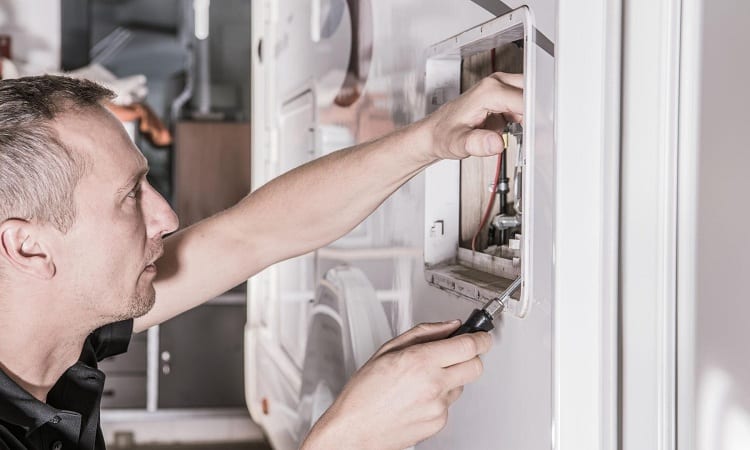
The thought of repairing an air conditioner for yourself might sound enticing, especially if you like to tinker in your RV and save money at the same time.
However, with something electrical and potentially dangerous like an AC, it’s not always the smartest idea.
If you’re confident that you’re able to repair the AC yourself and it doesn’t require any electrical work that’s outside of your scope, you can go right ahead.
For everyone else, it’s not worth the risk of working with a faulty appliance and putting your family and your beloved RV in harm’s way.
The smartest way to repair your AC is with ongoing maintenance and cleaning, as well as knowing the limitations of the unit.
While you can diagnose some basic issues that ACs encounter, it’s always safest to seek help from a professional to determine what’s wrong with it and how to fix it responsibly.
Quick Maintenance Tips for Your RV AC
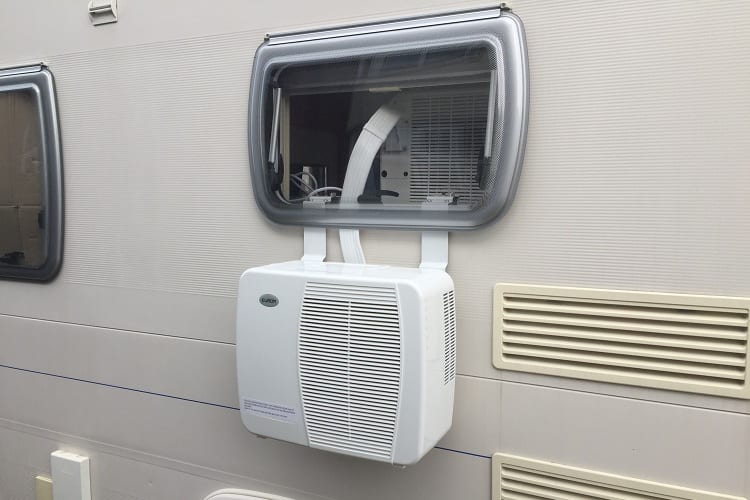
The best thing you can do for your air conditioner’s health is to stick to an ongoing maintenance schedule.
These are all things you can do regularly and without needing any mechanical or electrical skills that will keep your AC humming along in good condition.
Oil the fan
The fan inside of the air conditioner unit has a huge task of pushing the air around. To do so effectively, it needs to be lubricated, so check every few months that it doesn’t need a fresh bout of oil.
Adjust the thermostat settings
Spend some time adjusting the thermostat settings to make sure the AC is working for your specific environment.
Try to keep the temperature at a moderate setting rather than setting it too low, and it will be more effective without being overpowering.
Air out the roof vent
Now and then, open up the roof vent of your RV and let it get some natural air and sunlight. This can reduce moisture buildup which eventually does damage to the AC unit.
Keep it clean
Regular cleaning of the AC will do wonders for it and keep you on top of potential issues. The filters, evaporator coils, and condenser should all be cleaned every month during summer or when the AC is being used regularly.
Cover up
When you’re not using the RV, make sure you keep the air conditioner unit protected with a dedicated AC cover.
This will prevent a build-up of dust and protect it during the off-season so it’s ready to roll again when you are.
Knowing When It’s Time to Buy a New AC
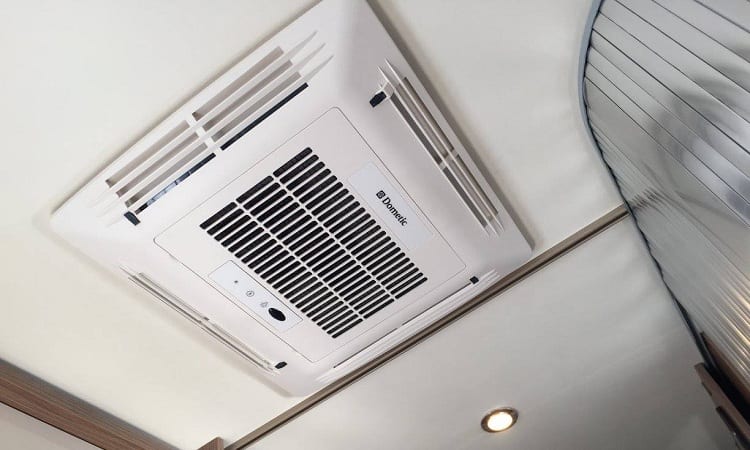
As a costly investment, it’s understandable that you might want to hang onto your old air conditioner for as long as possible. However, knowing when it’s time to give up and get yourself a new one is also important.
If your air conditioner is constantly causing you problems or it seems to require ongoing repairs, it may be time to bite the bullet and invest in a new one.
Not only is it expensive to keep fixing it but you’re putting yourself and your RV in danger of being exposed to a system like this with potential risky electrical faults.
Those traveling with older air conditioners should consider upgrading to a new one for energy efficiency purposes.
Newer models of ACs require less power to do more work and when you’re living in an RV and watching every watt you use, something that guzzles as much power as your old system could do with an upgrade.
Keeping Cool on the Go
The air conditioner is one part you don’t want to fail when it’s the middle of summer, so knowing how to perform some quick fixes and RV AC repair for yourself is a crucial skill to have.
With our tips and easy troubleshooting advice, you’ll be able to keep your RV AC humming along at least until you can call in the experts.
Related Questions
An air conditioner is an essential part of any RV that travels in the summer, and when it breaks down you realize just how much you rely on it.
If you’ve been thinking about installing or upgrading your RV AC and want to learn more about how they work, read on to see the answers to some commonly asked questions.
What Type of RV AC Is Best?
There are a few types of air conditioners that would suit an RV, with the most popular being the roof-mounted, free-standing, or window-mounted unit.
Depending on how much cooling power you need, the space inside of your RV, and what your power supply is capable of in terms of wattage, you’ll likely find one more suitable than the other.
How Many BTU Do I Need for My RV?
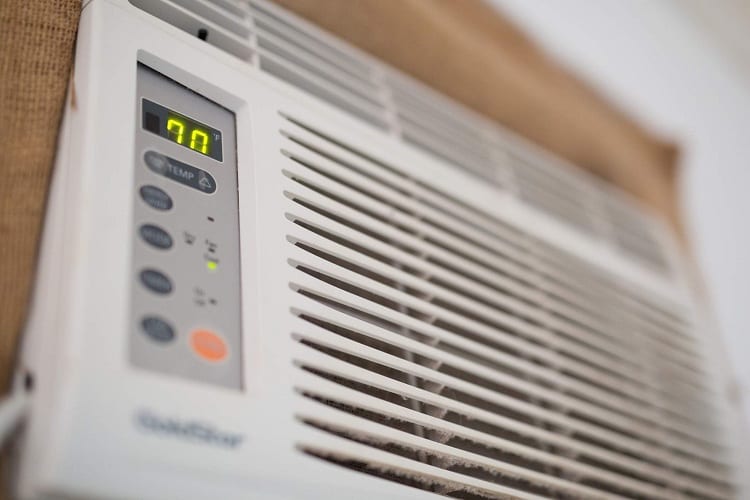
The BTUs of an air conditioner determine how much cooling power it has and for the average RV, you’ll need at least 11,000 BTUs from a system.
This can vary depending on the size of the RV’s interior and its requirements, and on the more powerful end of the scale these can range up to 18,000 BTUs and beyond.
Can I Run My RV AC At Night?
If you have an adequate power supply, you can easily run an RV AC through the night to keep you cool.
This is better suited to situations where you’re connected to an electrical hookup otherwise the power requirements of an AC unit can drain a battery or generator quickly.
Resources:

